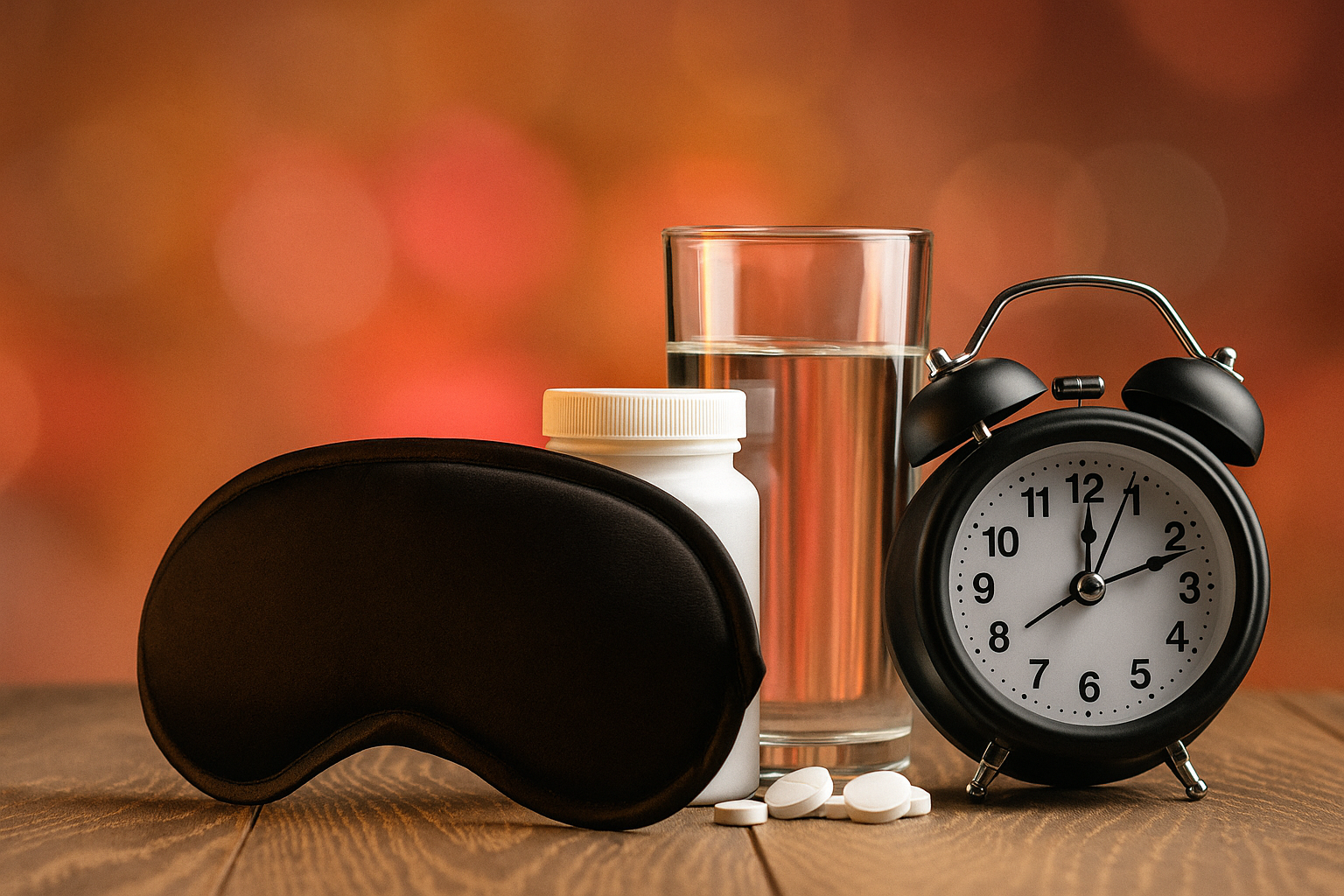Sleep disturbances rarely develop suddenly, they tend to progress gradually. It might start with the occasional late night or a morning when you just can’t shake the fog.
Over time, these moments add up, and we begin to think this constant tiredness is simply part of our life. But restful sleep is more than a luxury; it’s essential for keeping your mind sharp, your mood steady, your immune system strong, and your heart and body healthy.
- Sleep supplements such as melatonin or herbal blends that promote relaxation.
- Light-based interventions like wearable light therapy devices that reset your internal clock.
Each works differently, and in many cases, they work best when combined.
Supplements to Support Restful Sleep

For many people, supplements can be a comforting first step towards better sleep. They’re familiar, simple to use, and can slip easily into your evening routine without disruption.
Some popular and trusted options include:
- Melatonin: A natural hormone that signals your brain when it’s time for sleep, and it helps ease jet lag or shift or reset your sleep schedule.
- Magnesium: Helps relax muscles and calm the nervous system, making it easier for the body to wind down.
- Valerian root & chamomile: Time-tested herbal remedies that encourage relaxation without leaving you feeling groggy.
Why people prefer supplements:
- Works faster: Often helps you drift off more easily the very same night.
- Easy to find: Readily available over the counter or online.
- Comfortably familiar: No major lifestyle changes required, just a little extra support at bedtime.
However, supplements generally target symptoms, not causes. They’re best for short-term use or specific situations, such as travel, high-stress periods, or occasional insomnia. Long-term reliance can mask underlying issues like poor sleep hygiene, irregular schedules, or circadian rhythm disorders.
Light-Based Interventions for Resetting the Body’s Clock

If supplements are the “quick resolution,” light therapy is the “long game.” It addresses one of the most overlooked aspects of sleep, your circadian rhythm, the 24-hour cycle that governs when you feel awake and when you feel sleepy.
How it works: Devices like light boxes and light therapy glasses like retimer emit gentle blue-green light that mimics natural morning sunlight. This light stimulates part of the brain that regulates your internal clock, telling your body, “It’s daytime; time to be alert.” With disciplined use of 3-4 weeks, this can help shift your sleep schedule earlier or later, depending on your requirements.
Best effective usage for Light therapy:
- Delayed/Early Sleep Phase Syndrome: When your natural bedtime is much later than desired.
- Jet lag: Especially when crossing multiple time zones.
- Shift work: For those with overnight or rotating schedules.
- Winter Blues: To manage winter sluggishness caused by reduced daylight.
Benefits of light therapy:
- Non-invasive: No pills, chemicals, or dependency risk.
- Addresses root causes: Works on the biological systems that control sleep.
- Mood and energy boost: Exposure to the right light can improve alertness, focus, and even emotional well-being.
Light therapy requires timing and consistency. Using it at the wrong time of day can actually delay your sleep further, so following a proper schedule is essential.
You Don’t Have to Choose One
Supplements and light therapy work in different ways—one acts immediately, the other retrains your system over time. Used together, they can offer both quick relief and long-term correction.
Example 1: You’ve just flown from London to Singapore. You take melatonin to fall asleep earlier for the first couple of nights, while using light therapy glasses in the morning to help your body adjust faster to local time.
Example 2: You’re a night owl who wants to start sleeping earlier. For the first week, you take a mild herbal sleep aid at 10 p.m. to nudge your bedtime earlier, while using morning light therapy to reset your internal clock gradually.
This “dual approach” is particularly helpful for people with both acute and chronic sleep challenges.
The Lifestyle Connection
While both supplements and light therapy can help, they work best when paired with strong sleep hygiene practices:
- Consistent schedule: Go to bed and wake up at the same time daily, even on weekends.
- Light management: Get bright light in the morning, and dim lights in the evening.
- Limit stimulants: Avoid caffeine at least 6 hours before bedtime.
- Screen discipline: Reduce blue light exposure from devices at least an hour before bed.
- Sleep-friendly environment: Keep your bedroom cool, dark, and quiet.
Think of supplements as the “accelerator” and light therapy as the “steering wheel.” Without the right road, healthy habits, you won’t get far.
Choosing What Works Best for You

Consider these questions as you explore your options:
- Are you looking for relief tonight? A gentle, short-term supplement may provide the support you need.
- Are you aiming for lasting change? A light-based intervention could help reset your natural rhythm over time.
- Could a combination work best for you? Using both approaches in a thoughtful way may help you feel better sooner while building healthier sleep patterns for the future.
Better sleep isn’t just about closing your eyes; it’s about training your body to know when to rest and when to rise. Whether that means a pill, a pair of light therapy glasses, or both, the goal is the same: waking up genuinely refreshed, with steady energy all day.
Sometimes, better sleep starts with the smallest change, like a little extra light in the morning or a gentle nudge from a natural supplement at night. With the right approach, your best nights are still ahead.
 in Japan
in Japan


